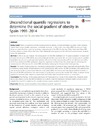Identificador persistente para citar o vincular este elemento:
https://accedacris.ulpgc.es/jspui/handle/10553/19095
| Título: | Unconditional quantile regressions to determine the social gradient of obesity in Spain 1993-2014 | Autores/as: | Rodriguez Caro, Alejandro González López-Valcárcel, Beatriz Vallejo Torres, Laura |
Clasificación UNESCO: | 531207 Sanidad 5302 Econometría |
Palabras clave: | Obesidad Salud pública Costes Desigualdad Modelos econométricos |
Fecha de publicación: | 2016 | Publicación seriada: | International Journal for Equity in Health | Resumen: | Background: There is a well-documented social gradient in obesity in most developed countries. Many previous studies have conventionally categorised individuals according to their body mass index (BMI), focusing on those above a certain threshold and thus ignoring a large amount of the BMI distribution. Others have used linear BMI models, relying on mean effects that may mask substantial heterogeneity in the effects of socioeconomic variables across the population. Method: In this study, we measure the social gradient of the BMI distribution of the adult population in Spain over the past two decades (1993–2014), using unconditional quantile regressions. We use three socioeconomic variables (education, income and social class) and evaluate differences in the corresponding effects on different percentiles of the log-transformed BMI distribution. Quantile regression methods have the advantage of estimating the socioeconomic effect across the whole BMI distribution allowing for this potential heterogeneity. Results: The results showed a large and increasing social gradient in obesity in Spain, especially among females. There is, however, a large degree of heterogeneity in the socioeconomic effect across the BMI distribution, with patterns that vary according to the socioeconomic indicator under study. While the income and educational gradient is greater at the end of the BMI distribution, the main impact of social class is around the median BMI values. A steeper social gradient is observed with respect to educational level rather than household income or social class. Conclusion: The findings of this study emphasise the heterogeneous nature of the relationship between social factors and obesity across the BMI distribution as a whole. Quantile regression methods might provide a more suitable framework for exploring the complex socioeconomic gradient of obesity. | URI: | https://accedacris.ulpgc.es/handle/10553/19095 | ISSN: | 1475-9276 | DOI: | 10.1186/s12939-016-0454-1 | Fuente: | International journal for equity in health [ISSN 1475-9276], v. 15(175) | Derechos: | by-nc-nd |
| Colección: | Artículos |
Citas SCOPUSTM
26
actualizado el 08-jun-2025
Citas de WEB OF SCIENCETM
Citations
28
actualizado el 01-mar-2026
Visitas
282
actualizado el 16-ene-2026
Descargas
159
actualizado el 16-ene-2026
Google ScholarTM
Verifica
Altmetric
Comparte
Exporta metadatos
Los elementos en ULPGC accedaCRIS están protegidos por derechos de autor con todos los derechos reservados, a menos que se indique lo contrario.
